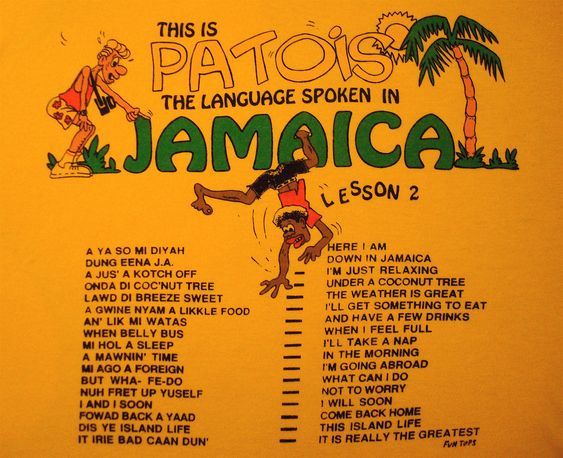

Do you have a boyfriend? – yuh hav a man?ģ8. Where is the beach? – weh di beach deh?ģ7. I’m joking with you – mi a ramp wid yuhģ6. I do not have any money – mi nuh hav nuh moneyģ5. I want to go swimming – mi waaan’ fi go swimģ3. Do you like to dance? – yuh like fi dance?ģ1. Where is the party? – wich paaat di paaty deh?ģ0. What are we having for breakfast? – wah wi a eet fi brekfass?Ģ7. Where is the bookstore? – wich paaat di bookstore deh?Ģ6. Where is the field? – wich paaat feel deh?Ģ5. Who sings this song? – a who sing da sang ya?Ģ4. Where is the bus stop? – weh di bus tap deh?Ģ3. Can I have some water? – Mi caa’n get sum wata please?Ģ1. What do you want to buy? – Weh u waan’ fi buy?Ģ0. Show me where this is located – mek me I know weh dis dehġ9. Let me find it for you – mek mi fine ih fi yuhġ8. I want something to eat – mi waannt summhh fi itġ7. I want to go to the beach – mi waannt fi go a beachġ4. No I have not eaten – no mi nuh eet areddyġ3. Did you eat yet? – yu nyam sumting areddy?ġ0. I do not understand what you are saying – mi nuh andastan weh u a sehĩ. No, I do not want it – no sah mi no want ihĨ. What do you want to eat? – Weh u waa’n nyam?ħ. So I’ve decided to create this guide of some common English phrases translated to Jamaican patwa so you can learn a little piece of the language.ĥ. Available at: WorldCat.You’re here because you’ve heard Jamaican Patwa either through friends, through Jamaican music, or through traveling to Jamaica and interacting with the locals… AND you liked how it sounds. Jonesboro, AR: Justuwait & See Productions and Grant House, 2009. Jamaican patwa no problem : a tourist's guide to Jamaican language and culture. Jamaican Patois words that everyone should learn at Youtube.Available at: WorldCat.Īdditional Resources Cave Hill, Barbados: University of the West Indies, 2002. Cassidy, Frederic Gomes, and Robert Brock Le Page.20 Essential Jamaican Patois Phrases Translated to English at.18 Jamaican Patois Phrases Translated to English at.Orthography (spelling system) at Wikipedia.List of Jamaican Patois words of African origin at WikipediaĪlphabet and Pronunciation.Kingston, Jamaica: LRD Enterprises, 1983.

Jamaicanisms : the Jamaican language from A to Z, a visitors' guide to native talk. It exists as mostly a spoken language but is used for musical purposes.The pronunciation and vocabulary are significantly different from English but the writing system shows commonalities with the English alphabet.Developed in the 17th century when slaves from West and Central Africa were exposed to the forms of English spoken by the slaveholders.Spoken by the majority of Jamaicans as a native language.English-based creole language with West African influences.Jamaican Patois (or Patwa) or Jamaican Creole. Both JSL and ASL are rapidly replacing Konchri Sain for a variety of reasons. The Jamaican education system has only recently begun to offer formal instruction in Patois, while retaining JSE as the "official language of instruction".Īdditionally, some Jamaicans use one or more of Jamaican Sign Language (JSL), American Sign Language (ASL) or the indigenous Jamaican Country Sign Language (Konchri Sain). A 2007 survey by the Jamaican Language Unit found that 17.1 percent of the population were monolingual in Jamaican Standard English (JSE), 36.5 percent were monolingual in Patois, and 46.4 percent were bilingual, although earlier surveys had pointed to a greater degree of bilinguality (up to 90 percent). "Pure" Patois, though sometimes seen as merely a particularly aberrant dialect of English, is essentially mutually unintelligible with standard English and is best thought of a separate language. The two exist in a dialect continuum, with speakers using a different register of speech depending on context and whom they are speaking to. However, the primary spoken language is an English-based creole called Jamaican Patois (or Patwa). The official language is English, which is "used in all domains of public life", including the government, the legal system, the media, and education. Jamaica is regarded as a bilingual country, with two major languages in use by the population.


 0 kommentar(er)
0 kommentar(er)
